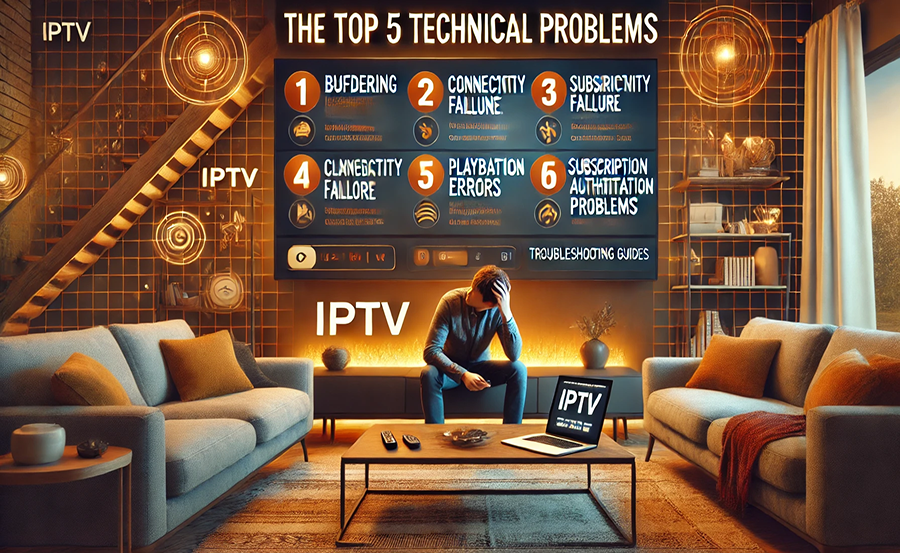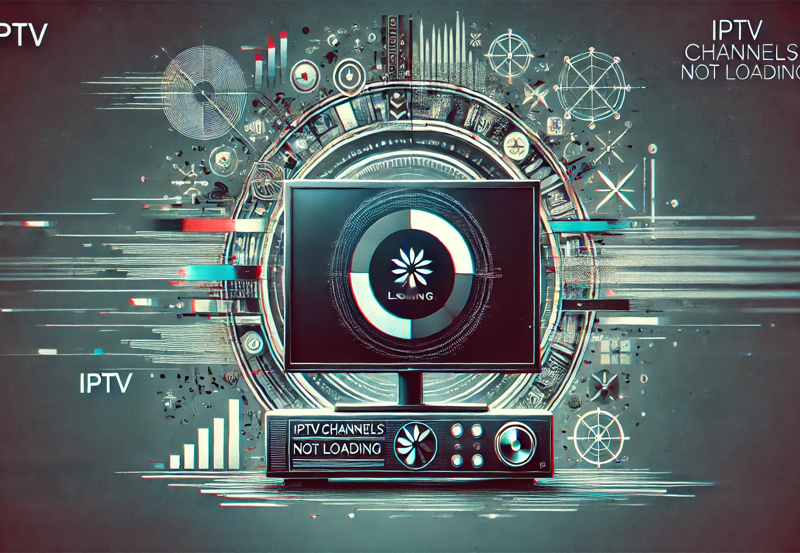Have you ever been frustrated by your IPTV stream lagging just as the big match or the much-awaited climax of a movie is about to unfold? If this sounds all too familiar, you’re not alone. IPTV latency issues can turn an otherwise pleasant viewing experience into a nightmare. But worry not! This guide will explore various strategies to boost your IPTV performance, allowing you to enjoy seamless streaming. In this article, we will uncover practical solutions and insights that you can apply today to transform your IPTV viewing habits into something smooth and enjoyable. want Buy 1 Year IPTV subscription
Understanding IPTV and Its Common Latency Issues
Before we delve into solutions, it’s vital to understand IPTV itself. IPTV, or Internet Protocol Television, delivers television content over the internet. Unlike traditional systems like satellite or cable, IPTV streams media content through the internet, offering the flexibility to watch at your convenience. However, this convenience can be marred by latency—when the stream takes too long to load. Causes can vary, so let’s break down the common culprits.
Bandwidth Limitations
Your internet connection plays a crucial role in determining the quality of IPTV streaming. Insufficient bandwidth is often a significant cause of latency. When your internet connection can’t support the data rate required for streaming, it leads to delays. High-definition and 4K streams consume substantial data, thus requiring faster connections.
Network Congestion
Just like traffic jams on a highway, network congestion happens when too many users are online simultaneously. During peak usage times, such as evenings or weekends, your internet speed can decrease. This ultimately causes delays in IPTV streaming, resulting in irritating buffering and lag.
Device Performance
Sometimes, the devices you use for IPTV can also be a bottleneck. Older or less powerful devices may struggle with high-quality streams. This is especially true for smart TVs, set-top boxes, and older mobile devices that might not have the hardware required to process large streams efficiently.
Why Do Devices Become Bottlenecks?
Devices become bottlenecks due to insufficient processing power or outdated software that can’t cope with the demands of modern IPTV applications. This often leads to performance hiccups, making consistent streaming a challenge.
Optimizing Your Internet Connection
Your internet connection is the backbone of IPTV performance. Improving your connection can remarkably reduce latency. Here are several ways to ensure your internet is up to the task:
Upgrade Your Internet Plan
If your current internet plan is limited in speed, consider upgrading. Many IPTV services suggest a minimum bandwidth of 10 Mbps for a single HD stream. If you’re in a household with multiple users or several streams running at once, a plan offering at least 50 Mbps or higher might be more suitable.
Utilize Ethernet Instead of Wi-Fi
Though convenient, Wi-Fi can be unstable due to interference from other devices, thick walls, or even neighbors’ networks. Switching to a wired Ethernet connection can provide a more consistent and reliable data transfer rate, significantly reducing latency issues.
Limit Other Internet Usages
During your streaming sessions, try to limit the use of other bandwidth-intensive applications. Downloads, online games, and large uploads can consume a considerable amount of your bandwidth. Pausing such activities can boost your IPTV’s performance.
- Consider setting Quality of Service (QoS) settings on your router
- Schedule downloads for off-peak times
- Turn off auto-updates on devices during streaming
Enhancing Device Compatibility and Performance
Part of overcoming latency is ensuring that your devices are optimized for streaming. Here’s how you can make sure your devices aren’t dragging down your IPTV quality:
Regular Software Updates
Ensure all your streaming devices have the latest software updates installed. These updates often come with improvements and bug fixes that can enhance streaming performance.
Invest in Modern Devices
If your current setup is outdated, consider investing in new hardware. Modern smart TVs and set-top boxes are designed to handle high-definition streams effortlessly, providing a smoother viewing experience.
Examples of Recommended Devices
Look for well-regarded devices from trusted brands, such as the latest models from Nvidia Shield, Roku, or Apple TV. These come equipped with powerful processors and advanced features that minimize latency.
Optimizing Device Settings for IPTV
Many smart devices come with settings that can be adjusted for better performance. For example, reducing screen resolution settings slightly or disabling unnecessary apps running in the background can free up resources.
Choosing the Right IPTV Service Provider
Even if you’ve optimized everything on your end, the quality of the IPTV service provider can significantly affect your experience. Selecting one of the best IPTV service providers can minimize latency and other issues.
Provider Reliability and Server Locations
A reliable provider should offer a network of servers that are geographically close to your location. This proximity reduces the distance that data needs to travel, optimizing streaming speed and minimizing latency.
Check for Reviews and Recommendations
Before subscribing, look for user reviews and professional critiques. Real user experiences give you insight into the reliability and quality of service you can expect.
Things to Look for in Reviews
Consider feedback regarding uptime, customer service responsiveness, and stream quality during peak hours, as these are crucial for an uninterrupted viewing experience.
Trial Periods and Refund Policies
Look for service providers that offer a trial period or a refund policy. This way, you can test the service without commitment, ensuring it meets your expectations before making a financial decision.
- Engage with IPTV resellers for promotional deals
- Ensure providers offer on-demand content that suits your viewing habits
- Check data privacy agreements thoroughly
Modifying User Habits to Improve IPTV Experience
Changing how you interact with IPTV might also help. Simple adjustments in viewing habits can enhance the overall experience.
Avoiding Peak Hours
If possible, watch during off-peak hours when the demand on the network is lower, leading to faster streaming and reduced buffering.
Regular Check-Ups on Service and Device Health
Regularly maintaining the health of your devices and service can prevent performance issues. This includes cleaning device caches, rebooting routers, and regularly monitoring internet speeds to catch any anomalies early.
Engaging with Communities
Online forums and communities can be invaluable, providing insights, sharing tips, or troubleshooting techniques tried by other users facing similar challenges.
Utilizing Online EFT Resources
Join EFT forums, engage on subreddit threads related to IPTV issues, and stay informed about the latest trends and solutions adopted by experts.
Closing Thoughts on Transforming Your IPTV Viewing Environment
IPTV latency problems can be daunting, but with the right approach, they can be managed effectively. By optimizing your internet connection, selecting the best IPTV service providers, upgrading devices where necessary, and adopting the best viewing habits, you can enjoy a smoother, more enjoyable IPTV experience. Remember, a little effort goes a long way in transforming your IPTV viewing habits into a seamless part of your digital lifestyle.
Frequently Asked Questions (FAQs)

What is IPTV, and how does it work?
IPTV, or Internet Protocol Television, transmits television programs and movies through an internet connection rather than through cable or satellite. It uses a packet-switched network to provide a continuous stream, allowing flexibility in viewing schedules.
Can upgrading my internet plan help with IPTV latency?
Yes, upgrading your internet plan can significantly reduce IPTV latency. Higher bandwidth can support multiple streams simultaneously, catering to HD or 4K content without interruptions.
Why is my IPTV buffering even when I have fast internet?
Buffering on IPTV might occur despite fast internet due to reasons like network congestion, poor device performance, or a less reliable IPTV service provider. Ensuring all factors are optimized, from devices to service quality, is essential.
How can choosing the right IPTV service provider improve latency issues?
Choosing a reputable IPTV service provider with robust infrastructure and servers close to your location can reduce data travel time, leading to faster streaming and minimal latency issues.
Do device updates really impact IPTV performance?
Yes, keeping your device updated ensures you have the latest functionality and bug fixes, which can enhance the streaming performance and reduce latency problems on IPTV services.
How often should I perform maintenance check-ups for my IPTV setup?
Regular check-ups are recommended, typically every few months or whenever you notice a drop in performance. These should include rebooting devices, checking router settings, and ensuring all firmware is current.
Are there communities where I can get help with IPTV issues?
Yes, numerous online forums and communities specialize in IPTV. Engaging in these communities, such as dedicated IPTV subreddits, can provide valuable advice and troubleshooting tips shared by fellow users.
How to Reduce Data Usage While Streaming IPTV





